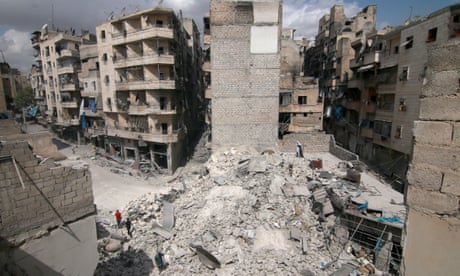- by foxnews
- 08 Apr 2025
Syria’s barrel bomb experts in Russia to help with potential Ukraine campaign
Syria’s barrel bomb experts in Russia to help with potential Ukraine campaign
- by theguardian
- 23 May 2022
- in news

Technicians linked to the Syrian military's infamous barrel bombs that have wreaked devastation across much of the country have been deployed to Russia to help potentially prepare for a similar campaign in the Ukraine war, European officials believe.
Intelligence officers say more than 50 specialists, all with vast experience in making and delivering the crude explosive, have been in Russia for several weeks working alongside officials from Vladimir Putin's military.
Their arrival is understood to be one factor behind US and European warnings that the Russian military may have been preparing for the use of chemical weapons in the conflict, which has entered its fourth month with little sign of slowing.
Barrel bombs - crude explosives packed in to a drum and dropped from a helicopter - were used to devastating effect throughout the Syrian war. The regime was also regularly accused of filling canisters with chlorine and dropping them on opposition held towns and cities, causing hundreds of deaths and sparking widespread alarm.
With no anti-aircraft weapons, the anti-Assad opposition had little to counter the Syrian military's air supremacy, which was a big factor in the regime clawing back parts of the country after 10 years of war.
The situation is very different in Ukraine, however, where Ukrainian troops armed with lethal ground to air missiles can bring down Russian jets and helicopters, stalling advances and exposing ground forces to withering artillery fire.
"This is probably why we haven't seen them cross the border," said one European official. "We know the capacity is there, but if they use it, they lose; we will know who's done it, and they will likely be killed anyway."
The barrel bomb specialists were at the vanguard of the forces the Syrian government sent to Russia to support Putin, whose backing had been instrumental in securing Assad regime's grip on power.
The officials believe between 800 and 1,000 Syrian troops have so far volunteered to travel to Russia, where the Kremlin has promised them salaries of between $1,500-$4,000 - up to 20 times the amounts they would receive in Syria, where an economic collapse has ravaged the local currency's value.
The Syrian government has established four main recruiting centres for the Russian deployment, in Damascus, Latakia, Hama and Homs. Recruits are deployed under contract with the Wagner Group, the Russian private military organisation, which has played a leading role in hiring mercenaries to support Russia's foreign adventures.
Wagner has been prominent in Libya and eastern Syria supporting Russia's interests. However, it has sometimes had a frayed relationship with the Kremlin. In early 2018, its forces were engaged in a brutal battle with US and Kurdish forces in the Syrian province of Deir Azzour, in which more than 140 mercenaries were killed, mainly by US artillery. European officials say that the Russian government had given a green light for the attack.
"It seems they had gotten too big for their boots," an official said. "We know for a fact that the Kremlin cut them loose."
Ever since though, Wagner has been central to Russia's actions. Its forces were among the first deployed into Ukraine and are accused of committing atrocities in Bucha, where up to 1,000 people were massacred over a few days in early April.
A relative of a Syrian army lieutenant who signed up to fight in Ukraine denied his uncle was a mercenary. "They are going there as a regular army unit," he said. "He is traveling with a full platoon. Only four of them didn't want to go. Putin did a lot for us, and we can help him now."
In late April, the Ukrainian government claimed that up to 25 Libyan or Syrian fighters had been killed in the town of Popasna, though this was denied by both Syrian officials and opposition members.
"I asked my uncle that," said the relative who refused to be named. "He said it's not them, but it might be Libyans. He insists that not one of them has crossed the border."
Wagner is thought to have deployed up to 500 men as reconnaissance elements in Ukraine. Many have been flown in from hotspots around north and central Africa.
- by foxnews
- descember 09, 2016
Ancient settlement reveals remains of 1,800-year-old dog, baffling experts: 'Preserved quite well'
Archaeologists have recently unearthed the remarkably well-preserved remains of a dog from ancient Rome, shedding light on the widespread practice of ritual sacrifice in antiquity.
read more


